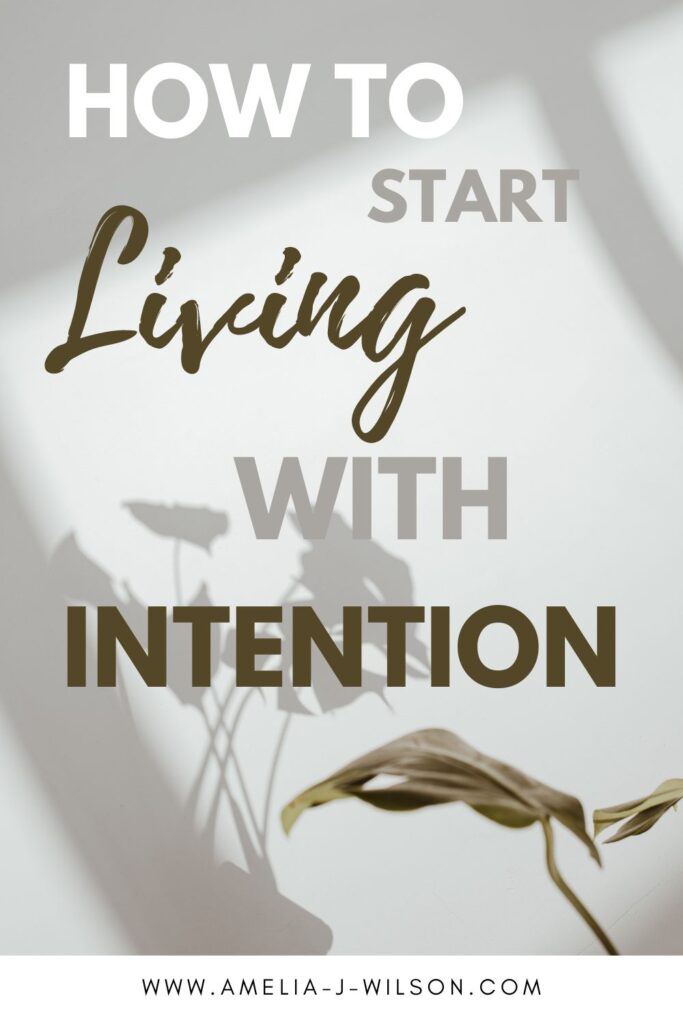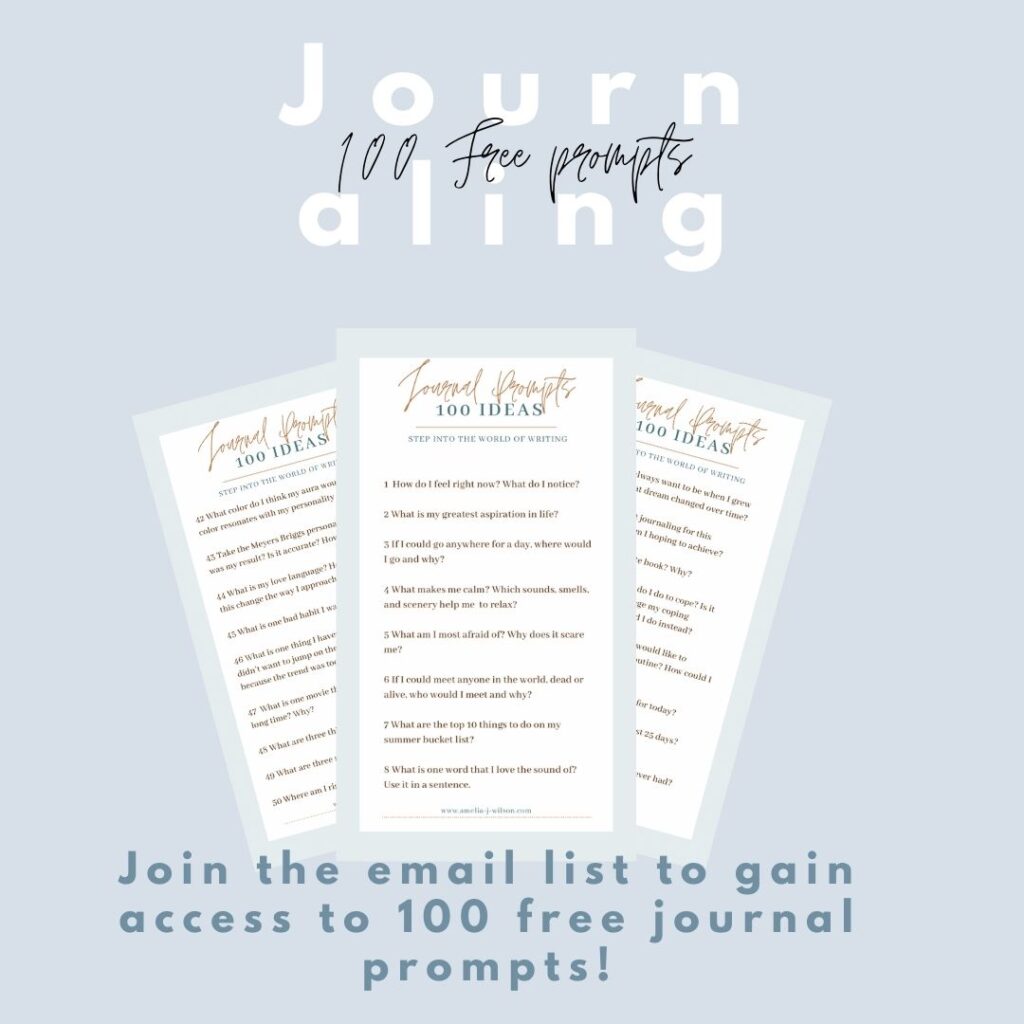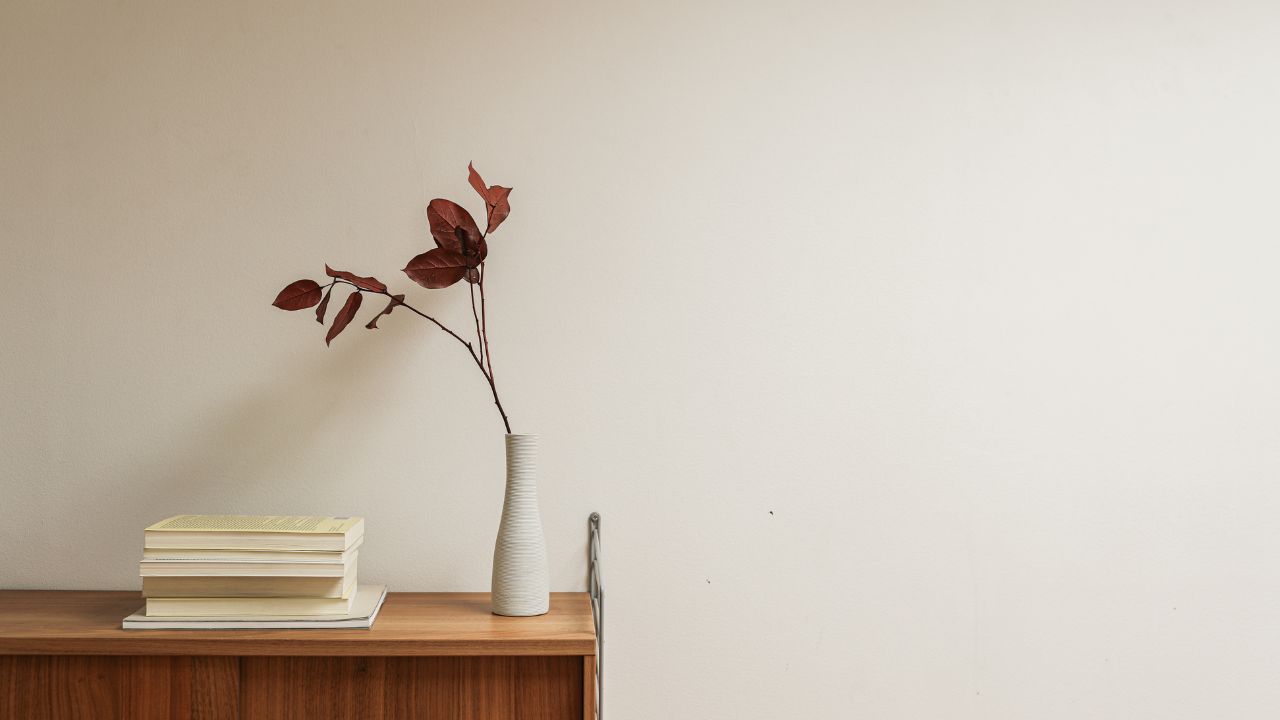You might have heard the phrase “intentional mindset.” But what does it mean? Why is it important?
Intentionality, in my opinion, is one of the core principles needed for spiritual growth and personal development. Aside from self-discipline or participating in a lot of shadow work, intentionality is one of those things that is NECESSARY if you’re on a journey to become your highest self or radically change your life into something you love.
Today, I wanted to dive into this topic in greater detail. Let’s answer some questions like:
- What does it mean to be intentional?
- What is an intentional mindset?
- How do you live with intention?
- And why is that so important?

Disclaimer: All of the views and opinions in this post are solely my own and are not sponsored. This post may include affiliate links, meaning I earn a commission through links at no cost to you.
What does it look like when we live intentionally?
Every day, we face choices. From what to have for breakfast, what to do after work, or even what movie to watch, our days—and honestly, our entire lives—are made up of a series of decisions that we make moment to moment.
Right now, for example, I made the decision to write this article and to post this topic on my blog so you could read it.
And you, on the other hand, made the choice to click on this article, read it, and perhaps pursue a more intentional lifestyle.
While EVERYONE faces different choices throughout their days, few people make intentional choices. Intentional choices are thoughtful. They are based in fact and made with care.
When we live intentionally, we make choices after careful consideration. We think before we act, so to speak. When we’re intentional, we use our previous experiences, goals, facts and outside information, and a careful opinion before we pursue any action.
It may sound simple, but it’s actually sort of tricky.
Think about it:
When was the last time you were very intentional about what you ate? Did you think of how healthy the meal was? How much energy it would give you? Did you think about how it was made or what ingredients were used? Or did you just choose something quick or simple?
Or, what about the last time you scrolled on social media? Did you choose a specific app for a reason? Or did you mindlessly click one? Did you scroll endlessly? Or where you checking up on something specific? How long did you spend scrolling? Did you mean to spend that much time on an app?
Being intentional is not necessarily natural. We are built to search for quick stimulation, quick solutions, maybe even the “easy way out” of distress or hardship. It’s OKAY to be that way. We’re all built like that. The important thing to understand is, you CAN change your thought process. You CAN be intentional. It just takes some work!
Now, you don’t have to be intentional ALL the time
While intentionality is great, you don’t have to be intentional about EVERY choice you make all the time.
There are times when fast food is the best choice. Like when you need a quick break from work, so you scroll on TikTok or Facebook. When you just want to watch a quick video before bed. Or when you’re in a hurry in the morning and don’t have time for a skincare routine, meditation, or journal session.
Sometimes it’s more effort than it’s worth to make the “intentional” or “right” choice. And that’s okay! The goal of living an intentional life is about being intentional about the big things. Be intentional whenever you can. Only YOU can transform your life. And only YOU can define what the right choice is or what your intentions are.
Why should you have an intentional mindset?
Okay, but why is having an intentional mindset so important?
Today, it’s easy to get caught in echo chambers when it comes to belief systems, political values, opinions, etc. And worse, it’s easier to lose sight of what we really want.
I can’t tell you the number of people I’ve met who lose sight of their dreams because they spend too much time seeking entertainment or pouring their energy into things that don’t benefit them.
If you can live with intention, you can better align your daily habits with your life goals.
For example, say you wanted to publish a book one day. But you find that you never have time to write. Maybe you don’t have time to research your book topic. Maybe you get bogged down with work.
Sh*t happens. And soon, you’ve lost sight of that dream.
BUT! Let’s consider for a moment how living with intention could change that!
You want to publish a book one day. So, you make a plan to research your book topic for two hours every week, and you hold yourself to that. Then, you give yourself thirty minutes each night to work on the book. Sure, you take breaks now and again. But whenever you reach your phone to scroll TikTok, maybe you opt for working on the book instead.
In time, you will have a full manuscript in front of you because you have made choices that would help you reach your goal. And maybe, in doing so, you were also able to lead a more fulfilling life.
Benefits of intentional living:
- Life feels less stressful
- You’re able to accomplish your goals
- You make decisions that benefit you
- You make decisions that benefit your health or well-being
- Life feels lighter and more joyful
- You don’t feel bogged down by regret
- You feel more assured of your abilities
How to live your life with intention
Below are some of the ways you can begin living your life with intention. It’s important to note that while all of these things can greatly impact your life, bring you more happiness, and help you feel more healthy and fulfilled, trying to do ALL OF THEM at once will be a challenge.
I’d recommend starting out slow.
Pick one or two ideas from below and focus on them for a few weeks to a month. They say it takes 21 days to form a habit! Once you’ve become comfortable with one change, pick another area to work on.
Life is composed of small habits and changes each day. You’ll never be “perfect” at any of the intentional living ideas below. I know I’m not! The idea is to move slowly. Focus on the intention rather than on the success. Perfection is not possible, but you CAN change your life.
Take it slow, and good luck!
Start and end your day the right way
Is there such a thing as “the right way”?
Technically, yes. But this can look different for everybody. Depending on your needs, your morning or evening routine can look vastly different from someone else’s and yet, both of you will be living in an intentional way.
If you want your mornings and evenings to be intentional, here’s what I would suggest doing:
In the mornings…
- Figure out your natural sleep rhythm. This can be hard if you work in a demanding job or have a lot of busy school activities. But ideally, figure out when your body naturally wants to wake up and when it wants to sleep. How many hours of sleep do you need to feel alright? Do you need naps? What times of the day do you feel most awake or most sluggish?
- Plan your day around this sleep cycle. For me, that looks like doing most of my mental activities in the morning, physical activities around lunchtime, an afternoon nap, relaxing activities, dinner, and then more physical or mental activities before bed!
- Add something mindful to your mornings like a journaling session, morning meditation, morning affirmations, a daily card reading, stretching, yoga, morning workout, etc.
- Try to drink at least one cup of water in the morning.
- Have a healthy breakfast.
In the evenings…
- Stop using tech about 1-2 hours before bed.
- Try reading in the evenings.
- Fill your evening with mindful activities like meditation, yoga, reading, learning, stretching, deep breathing exercises, card readings, spiritual routines, a bath, skincare routines, etc.

Stop consuming so much social media
This one can be challenging. In the age of information and quick dopamine hits, it’s easier than ever to over-consume social media and online content.
But how do you stop?
First, I’d recommend educating yourself on the topic a bit.
My partner and I watched a documentary called The Social Dilemma. It’s on Netflix, and it covers many of the addictive issues regarding social media use. Many top employees at Google, Pinterest, Facebook, and other tech giants are interviewed in this doc and give their perspectives on the “social dilemma.” It’s a great, albeit bittersweet, watch, and I highly recommend it for anyone interested in learning more!
As far as other techniques/tricks that I have on cutting back on social media usage, app limits are a BIG ONE!
If you have an Apple iPhone, you can set time limits on apps you use too much. I use TikTok a ton, and when I dove into my screen time data, I found out that I had spent an average of one to two hours of my day scrolling on the app. To put it into perspective, I’m awake about fourteen hours a day. That means that I was spending about 1/7th or 15% of my day on ONE APP! That’s a lot!
So, I set limits.
I have time limits on all of my social media apps. I also have limits on entertainment apps like YouTube, Prime Video, and Netflix.
To take it a step further, you can set your phone to have a specific “downtime.” Doing so will prohibit you from accessing certain apps at night, will shut off notifications at bedtime, and will help you limit your screen time before bed.
As difficult as it is, putting your phone away two hours before bed can be a game changer. It encourages you to spend your time offline, with your family, reading, journaling, or spending your evening in a different way.
Learn about the nature of food and change your diet
There’s a saying going around that the gut is the second brain. While I’m not entirely sure if that’s true, the importance of a healthy gut seems vital to our mental, emotional, physical, and spiritual well-being.
I want to preface this particular section with the disclaimer that I am NOT a dietitian, nutrition expert, doctor, or any qualified person regarding food and nutrition. I’m just an ordinary person with an interest in being healthy and eating well.
Now that that’s cleared up, I wanted to give a small anecdote of my personal experience. Since being more intentional with my diet and what I consume, I have drastically changed my health. I used to experience severe migraines nearly five times a month. These migraines would cause me to sleep for seventeen hours straight, on average. That’s pretty much 5 days GONE out of each month for me.
After years of dealing with this, I finally changed my diet. Now, I changed my diet because I learned more about gut health and nutrition. I didn’t think it would impact me in any noticeable way. But it did.
These days, I only get a migraine about once a month when my menstrual cycle throws off my hormones. Additionally, I feel more energetic, excited, focused, and happy with my life.
Again, I’m no doctor or dietitian. But from my experience, gut health is everything. It’s so directly tied to all other areas of our lives, and it completely boggles my mind!
If you want to learn more about nutrition, I recommend heading to these resources to start out. But ultimately, do your own research and talk to a specialist if need be.
- Gaia has a ton of nutritional videos and documentaries that I’ve adored. What’s with Wheat? was one I really enjoyed (though I admit, I still eat wheat.) But the platform has dozens of amazing videos on the topic of nutrition.
- On Netflix: I liked Seaspiracy and What the Health
- Amazon Prime Video also has plenty of resources!
- And, of course, there are dozens of other online resources on this topic!
Once you know more about nutrition and what goes into your food, it’s easier to be more intentional about what you consume.
Learn your love language
I’ve discussed love languages before on this blog, so I’ll leave a few links below to learn more. But essentially, knowing your love language can help you be more intentional in relationships.
When you know what type of love you like to receive, you can either find someone who already enjoys giving love in that way OR you can tell your partner what you need to feel wanted and fulfilled. Knowing your, your partner’s, your friends, and your family members’ love languages will help you recognize when people are being affectionate and also help you to teach others how to love you.
We all give and receive love in different ways. And from personal experience, knowing about the different love languages has greatly improved my close relationships with others.
Types of love languages:
- Physical Touch
- Quality Time
- Receiving Gifts
- Words of Affirmation
- Acts of Service
Articles for reference:
Figure out your learning style
Knowing your learning style can make learning anything a breeze. Public school systems tend to neglect catering to everyone’s individual learning style. And while it’s understandable that the educational system needs to work for the majority, it can lead some people to think that they aren’t very intelligent or that they simply aren’t fit for “learning.”
But humans are natural learners. We have great curiosity and a need to find answers.
But we all learn in different ways.
The current educational system mostly caters to reading and writing learners. This means that these types of learners will excel while others may be left behind.
BUT! The good news is that several studies have been conducted to better understand the different types of learning. If you want to understand a new language, learn how to build a car from nothing but parts, learn to be a better home chef, or better understand computer code, you may benefit from knowing your learning style.
AND by knowing your learning style and actively using it, you might find that you enjoy learning more than you did in school!
Here is a video I made regarding this topic if you want to learn more!
Stop impulse buying. Stop falling into consumeristic traps
Being intentional applies to every area of life: what you eat, what media you consume, what you learn, what you do, and what you buy.
Impulse buying, giving into sales or coupons, consumerism, and retail therapy plague many Western nations. Consumer culture is real, and many of us are a part of it.
Thoughtlessly, we buy things we don’t need from brick-and-mortar stores, Amazon, Etsy, eBay, etc. Advertisements flood our feeds, and we can’t drive a mile without seeing some billboard or sign trying to get us to buy something.
It’s just how it is, I think. This is just the society we live in.
But the thing is, you don’t have to fall prey to consumeristic traps. You don’t have to buy a ton of things to be happy.
Of course, you don’t have to be a minimalist either! I know I’m not!
(Here’s a really old blog post I wrote about minimalism. It’s not amazing, but it gets the message across!)
But being intentional about where, how, when, why, and on what you spend your money can help you live a more thoughtful and curated life.
How can intentional spending change your life?
- It generates less waste
- Saves you money
- Gives you a chance to save up for experiences or things that truly matter to you
- Helps you keep a clutter-free lifestyle
- Keeps you from getting addicted to buying things
- Helps you feel more fulfilled about what you own
Find gratitude and joy wherever you can
Lastly, the best way to lead a life of intention is to find gratitude and joy wherever you can. Keep a gratitude journal, jot down your thoughts and feelings, write out or speak affirmations, document the little moments, etc.
Doing so can help you feel whole and satisfied. It helps you feel more in control of your life and gives you a sense of purpose and direction.
I hope this article helped teach you about intentionality and gave you an idea of where to begin your journey to living with more intention.


